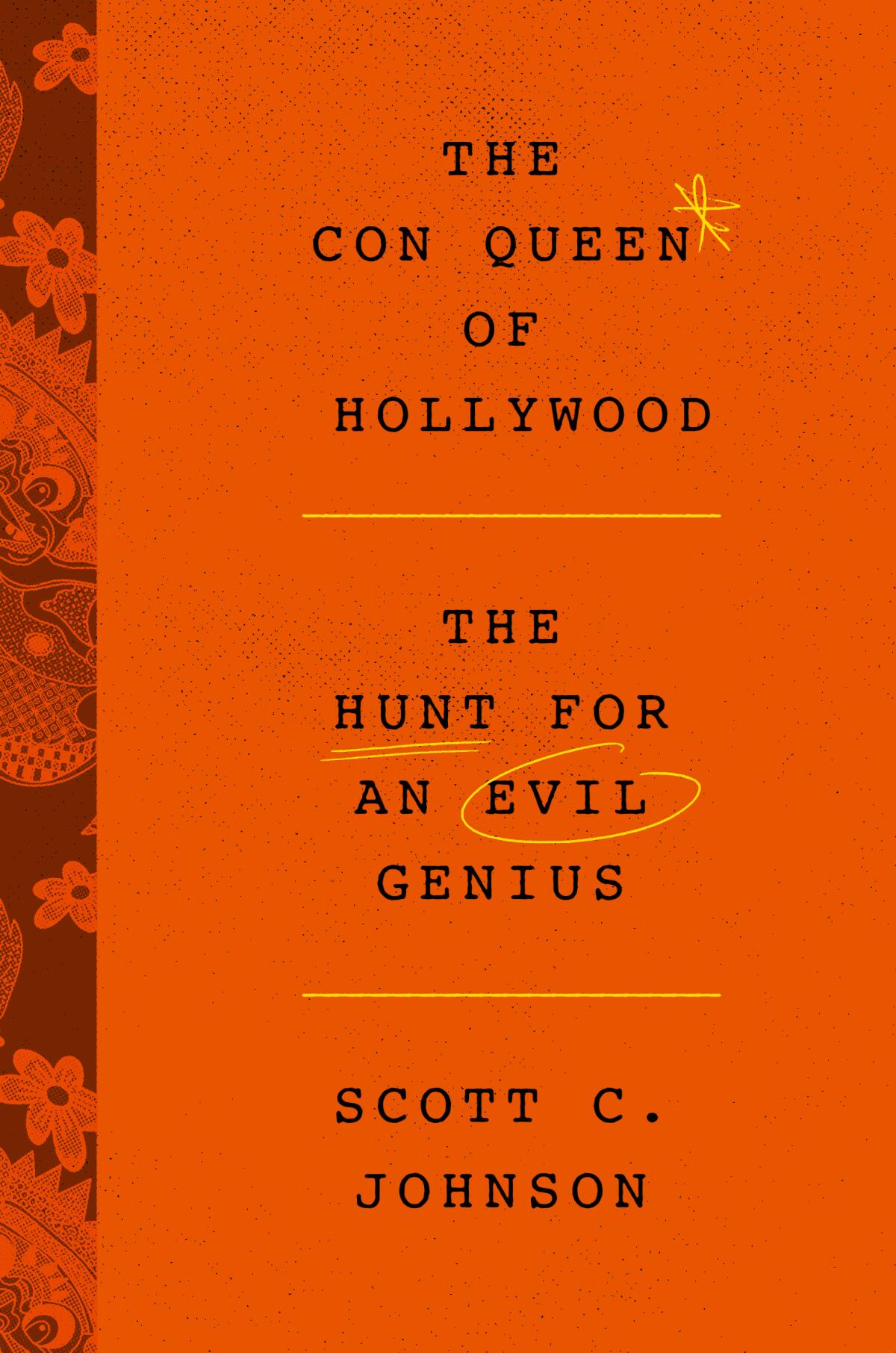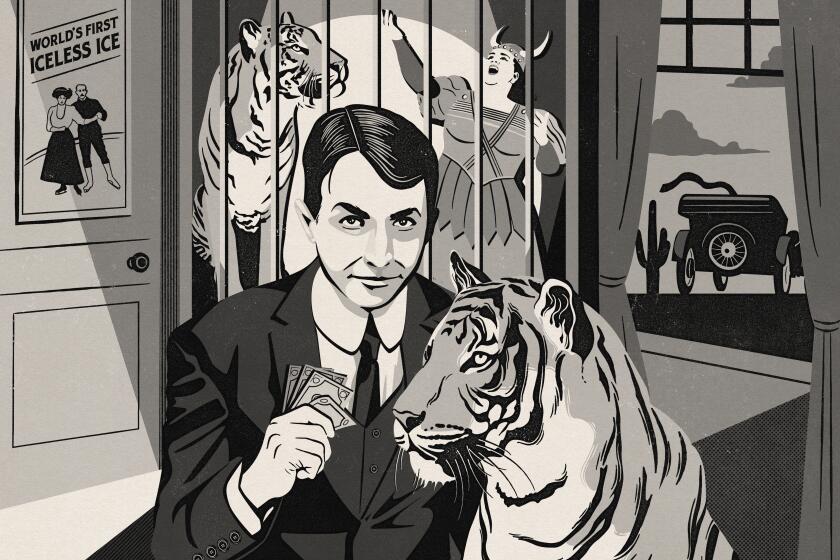How a mysterious ‘Con Queen’ impersonated moguls and duped Hollywood

Review
The Con Queen of Hollywood: The Hunt for an Evil Genius
By Scott C. Johnson
Harper: 256 pages, $30
If you buy books linked on our site, The Times may earn a commission from Bookshop.org, whose fees support independent bookstores.
You might get a vertiginous feeling as you tear through “The Con Queen of Hollywood,” as if the ground beneath your feet were slowly dissolving with each page turned.
Much like its subject, a possibly psychopathic fraudster who specialized in impersonating powerful female entertainment executives, Scott C. Johnson’s book is a shape-shifter, morphing from true crime investigation to memoir to travelogue to an examination of mythology and linguistics and journalistic ethics. If it occasionally tears off more than it can chew, it does so thrillingly and with writerly precision. And despite the thematic depths it mines, it is a rocket of a book that can and should be consumed in a headlong dash for maximum effect.
We begin in a shroud of mystery. A series of artists and craftspeople — a cinematographer, a screenwriter, a still photographer — receive convincing, out-of-the-blue and elaborate solicitations for what sound like dream projects working in Indonesia.
She threw a welcome party for herself at the Ace Hotel in downtown Los Angeles, a beautiful old building with black and white marble, Alice-in-Wonderland floors.
The person who hooks the cinematographer and the photographer (among others) claims to be the powerful Hollywood executive Amy Pascal. “Pascal” strings them along through a steady stream of phone calls, emails and video calls (always with the camera turned off), sending them wandering through foreign lands, sometimes verbally abusing them, all the while insisting they will soon be reimbursed for their financial outlay. And then, Pascal — or, sometimes, Wendi Murdoch or Christine Hearst Schwarzman or Kathleen Kennedy — vanishes like a digital-age Keyser Söze.

It’s a crazy story, and Johnson, a longtime journalist and foreign correspondent, takes it in unusual but generally fruitful directions. A private investigator, a hard-charging New Jersey woman, enters the picture and discovers the scam artist’s true identity. So does Johnson, who embarks on his own obsessive journey into this heart of darkness. If you haven’t been following the recent news stories and wish to approach the book in full suspense (the culprit was recently cleared for extradition to the U.S.), this might be a good time to stop reading.
Hargobind Tahilramani was born in Indonesia, the third child of an Indian family that he appears to have tormented from an early age. Deeply antisocial, prone to violent tantrums and long conversations with imaginary friends, he absorbed himself in movies, TV and automated phone sex and became a master of mimicry.
Tahilramani spent time in the U.S., where he was active in the college speech and debate world, and once terrorized two college debaters by threatening them over the phone in the voice of Cate Blanchett. He was eventually imprisoned for making terroristic bomb threats in his native land, where he had also been committed to mental institutions. One of his two sisters, in lieu of using his real name, simply refers to him as “Monster.”
‘The Dropout,’ ‘WeCrashed’ and ‘Super Pumped’ showcase the ‘death of the millennial dream.’
An unhinged, highly imaginative sadist, the Con Queen makes Patricia Highsmith’s Tom Ripley look like a rank amateur. And he proves utterly fascinating to Johnson, who uses his subject as a springboard into a variety of musings and avenues of self-discovery.

This is a risky move; as journalists we are often told that we are not the story. On the other hand, we’re also reminded to write what we know. Regardless of your favorite adage, an author needs to be in full command of their craft to navigate first-person waters.
Johnson may slip here and there as he slides down his chosen rabbit holes, but his gambits are more than worth the reader’s while. Detours into his own family history, Indonesian mythology, the mindset of both predator and prey and his own motives as a journalist don’t just help illuminate his primary target; they also strip away layers of impassivity and turn the book into a more visceral experience.
At one point Johnson draws on Janet Malcolm’s 1990 book “The Journalist and the Murderer” and its controversial opening salvo: “Every journalist who is not too stupid or full of himself to notice what is going on knows that what he does is morally indefensible.” (Malcolm was, of course, a journalist.)
As Johnson tracks Tahilramani, locates him in England (where he was working various scams and moonlighting as a food blogger) and engages him in a series of long, exhausting conversations, he floats in and out of sympathy for the devil, and comes to question his own motives and complicity.
“Con Queen” is largely the story of one disturbed individual and the havoc he was able to wreak. But it’s also about the transactional nature of life itself, the reasons we do what we do and believe what we choose to believe.
Hollywood scamming is a tradition. The century-old saga of Paul Bourgeois — cinematographer, animal wrangler, con artist — shows how far back it goes.
The Con Queen, after all, could not have succeeded if his marks hadn’t eagerly walked into the traps he had laid. Tahilramani may just want to watch the world burn, but the rest of us, or most of us anyway, are after something else. “The Con Queen of Hollywood” haunts us with the question of what that thing might be. Just as important, it also happens to be one hell of a yarn.
Vognar is a freelance writer based in Houston.
More to Read
Sign up for our Book Club newsletter
Get the latest news, events and more from the Los Angeles Times Book Club, and help us get L.A. reading and talking.
You may occasionally receive promotional content from the Los Angeles Times.









